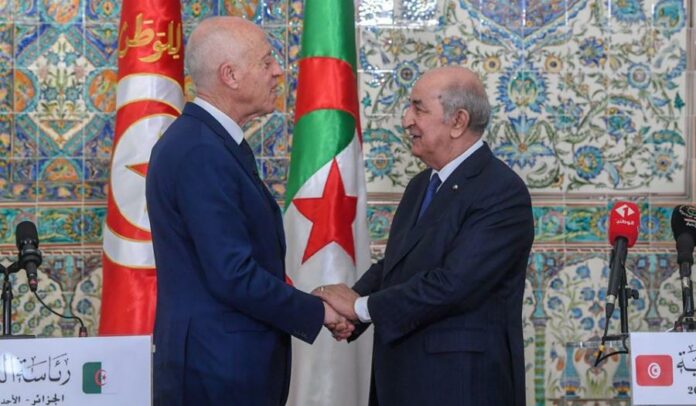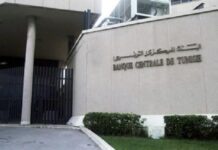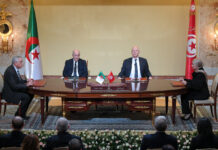The successive contacts of Algerian President Abdelmadjid Tebboune with Tunisian President Kais Saied and the repeated visits of Algerian Foreign Minister Ramtane Lamamra to Tunisia reflect a concern that Algeria has not been able to overcome since Kais Saied announced a series of measures on the twenty-fifth of last July, foremost of which is the freezing of Parliament and the dismissal of Prime Minister Hichem Mechichi.
The Tunisian presidency stated in a statement on Monday that President Said met Lamamra at the Carthage Presidential Palace, who handed him a written message from President Abdelmadjid Tebboune. The statement did not address the content of the message. The Tunisian presidency stated in a statement on Monday that President Saied met Lamamra at the Carthage Presidential Palace, who handed him a written message from President Abdelmadjid Tebboune. The statement did not refer to the content of the message.
After the meeting, Lamamra said, “The sensitive historical stage witnessed by the region and the multiplicity of challenges require further consolidation of the practice of continuous coordination between Tunisia and Algeria in the service of the common interest of the two brotherly peoples.”
In turn, the Tunisian president reiterated “expressing firm keenness to continue coordination and consultation with Algeria regarding bilateral and regional files in order to enhance the security and stability of the two countries and to confront all threats targeting the region.”
Algeria’s concern increased with Saudi Arabia’s openness to Tunisia and its support for President Saied’s decisions. It is following with suspicion the developments taking place in Tunisia after the Islamists were removed from power, and this concern intensified due to Saudi Arabia’s openness to Tunisia and its support for the decisions of Kais Saied.
Observers link Lamamra’s visit to increased coordination between Tunisia and Saudi Arabia, as Kais Saied met on Sunday with Saudi Minister of State for African Affairs Ahmed bin Abdulaziz Qattan, a meeting that was preceded by a phone call with Saudi King Salman bin Abdulaziz.
Kattan headed a Saudi delegation that held an extensive meeting with Tunisian ministers and senior officials, devoted to examining ways of cooperation between the two countries in the coming period.
Relations between Algeria and Saudi Arabia have been cold for years, as the two countries differ on many issues and files, such as the Syrian and Libyan files, in addition to Algeria’s good relationship with Iran, which Saudi Arabia considers an adversary that threatens its security in the region.
Algeria views Tunisia as an outlet at the regional level, especially after the decline of its influence in the Sahel region and its inability to intervene in Libya, which has become an arena for the struggle of the major world powers. As for Morocco, it is its equal and rivals it regionally and in Africa.
The relationship with Morocco reached a crisis point after Algeria accused Rabat of “conspiring” with Israel and causing fires, despite the fact that the Mediterranean basin as a whole suffers from the fire disaster after an exceptional rise in temperatures. After his meeting with President Said, Lamamra described the fires as a “phenomenon,” before returning to “correct” the word, which turned into “actions.”
The developments in Tunisia surprised Algeria, which was preparing to revive its diplomacy, which witnessed a significant decline during the last years of the rule of former President Abdelaziz Bouteflika, as it announced its efforts to mediate between Egypt and Ethiopia in the issue of the Renaissance (Ennahdha) Dam, and began to lead efforts to expel Israel from the African Union.
This is Lamamra’s third visit to Tunisia in less than a month. He conducted the first on the 27th of July and the second on August 2, during which he met President Kais Saied and his Tunisian counterpart Othman Jerandi, and discussed with them strengthening cooperation between the two countries and regional issues of common interest.
On Monday, the Algerian presidency said that Tebboune had made a phone call with his Tunisian counterpart, Kais Saied. A statement by the presidency, carried by Algerian television, stated that the call dealt with strengthening bilateral relations in various fields, during which President Tebboune assured his counterpart Kais Saied of Algeria’s solidarity with Tunisia at this “delicate stage.”
Throughout the days of the crisis, Tebboune had several phone calls with Kais Saied, during which they discussed the developments in the situation in Tunisia, and recently unofficial information was circulated stating that there was Algerian mediation to resolve the Tunisian crisis, but the authorities in the two countries refuse to comment on this.
On August 8, Tebboune made media statements in which he expressed Algerian concern over what is happening in Tunisia. “We do not interfere in Tunisia’s internal affairs, and we do not impose anything on it,” Tebboune said.
“Tunisia is moving towards a solution to its internal problems,” he added, indicating that the current crisis is because Tunisia “has chosen a system that is not in line with the composition of the Third World,” but what is happening remains an internal matter.
Algeria’s coordination with Tunisia coincides with the approaching end of the exceptional measures announced by the Tunisian president, while observers expect that Kais Saied will announce in the coming days his quest to change the country’s system to a presidential one through a popular referendum.











